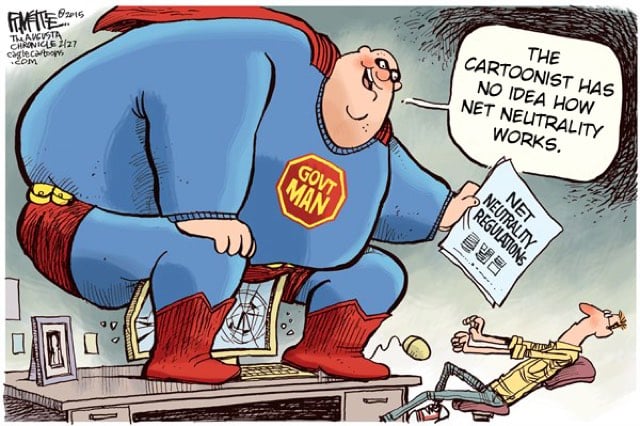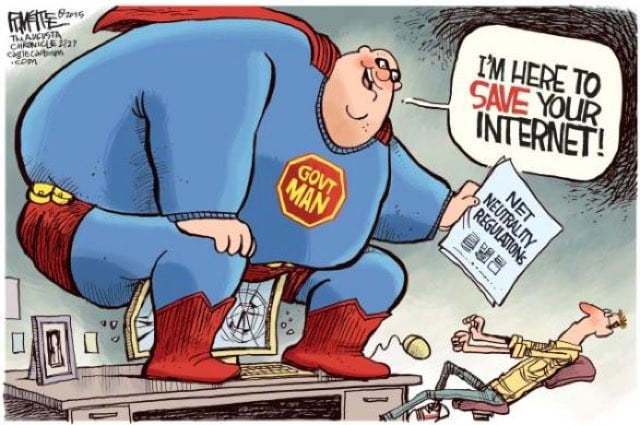The pizza metaphor of net neutrality

Net neutrality has been explained using pizza at least three times. Jason flagged this dead-to-rights analogy by Craigslist founder Craig Newmark from 2006:
Let’s say you call Joe’s Pizza and the first thing you hear is a message saying you’ll be connected in a minute or two, but if you want, you can be connected to Pizza Hut right away. That’s not fair, right? You called Joe’s and want some Joe’s pizza. Well, that’s how some telecommunications executives want the Internet to operate, with some Web sites easier to access than others. For them, this would be a money-making regime.
Recently, John Bergmayer, senior counsel at Public Knowledge, brought the pizza metaphor back:
Here is a simple metaphor: The telephone system, which has long been regulated to protect the public interest. You probably wouldn’t like it if you tried to order pizza from your favorite local place and were connected to a Papa John’s instead because it had got some special deal. Or if a Verizon telephone only connected to other Verizon phones. Obviously, there are a lot of differences between internet access and the telephone and how they work and how they are built, but the basic principle that essential communication systems ought to be non-discriminatory is the same.
However, the most deliberate and thorough consideration of Internet-as-pizza came before either of these interventions, and it came from the late Supreme Court Justice Antonin Scalia. In a dissent in 2005’s NCTA and FCC v. Brand X Internet Services’s decision, Scalia wrote:
If, for example, I call up a pizzeria and ask whether they offer delivery, both common sense and common “usage,” […] would prevent them from answering: ‘No, we do not offer delivery-but if you order a pizza from us, we’ll bake it for you and then bring it to your house.’ The logical response to this would be something on the order of, ‘so, you do offer delivery.’ But our pizza-man may continue to deny the obvious and explain, paraphrasing the FCC and the Court: ‘No, even though we bring the pizza to your house, we are not actually “offering” you delivery, because the delivery that we provide to our end users is “part and parcel” of our pizzeria-pizza-at-home service and is “integral to its other capabilities.”’… Any reasonable customer would conclude at that point that his interlocutor was either crazy or following some too-clever-by-half legal advice.
For Scalia, delivery is delivery. You buy the access to the internet — plus telephone, or cable, TV, or whatever it is you’re paying for — and you buy the access to the pipe. “It is therefore inevitable that customers will regard the competing cable-modem service as giving them both computing functionality
and the physical pipe by which that functionality comes to their computer —both the pizza and the delivery service that nondelivery pizzerias require to be purchased from the cab company.”
Like so many things, it’s a fiction to avoid regulation:
The Court contends that this analogy is inapposite because one need not have a pizza delivered… whereas one must purchase the cable connection in order to use cable’s ISP functions. But the ISP functions provided by the cable company can be used without cable delivery — by accessing them from an Internet connection other than cable. The merger of the physical connection and Internet functions in cable’s offerings has nothing to do with the “inextricably intertwined” nature of the two (like a car and its carpet), but is an artificial product of the cable company is marketing decision not to offer the two separately, so that the Commission could (by the Declaratory Ruling under review here) exempt it from common-carrier status.
Of course, getting the pizza (or the Internet) delivered to your house is the whole point, as the telecommunications companies understood full well:
The myth that the pizzeria does not offer delivery becomes even more difficult to maintain when the pizzeria advertises quick delivery as one of its advantages over competitors. That, of course, is the case with cable broadband.
Scalia was a first-rate jerk, and often extraordinarily wrong, but was generally solid on tech issues. He understood them, not in a technical way, but in a practical one. He also understood how to reason about them, both from analogy and from principle. He was never bumfuzzled, and was rarely compromised. His conservative successors haven’t proved to have the same qualities.
It’s good to look back at this, though, because it shows that we’ve been in an endless tug of war over net neutrality for more than twenty years. Even in 2014, it looked like the Obama-appointed regulators were as likely to gut net neutrality as reinforce and codify it. The new deregulation of the internet is a loss, but it doesn’t have to be a permanent one, unless we let it.
It also helps us to never forget that the FCC’s Ajit Pai danced with a Pizzagate conspiracy promoter before taking a dump all over the World Wide Web. I can’t say exactly how this ties into the pizza metaphor. But it’s in there somewhere, like a bad topping buried under too much cheese.
(via The Atlantic and Adrienne LaFrance)







Stay Connected